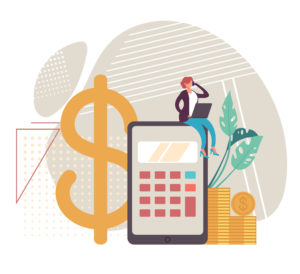As many small businesses struggle to survive the pandemic, loans have become a lifeline. If you need money and are able to borrow it, be sure to understand what it means from a tax and financial perspective. Here are some key issues to consider.
Financial issues
When you take a loan, it requires repayment (unless there is forgiveness, which is discussed later). Servicing a loan means repaying the principal—the amount you borrowed—as well as interest.
It’s essential that debt servicing is factored into your budget so you have enough cash on hand each month to pay what’s owed. Falling behind in loan repayments can produce dire consequences:
- Hurt your credit rating
- Result in the loan being called, which means immediate repayment of all that’s owed
A loan is a liability reported on your balance sheet. Even if you aren’t delinquent in loan repayment, having an outstanding loan can reduce your credit rating. This can prevent you from additional borrowing or cost you more if you do (e.g., a higher interest rate on a car loan).
Tax issues
You aren’t taxed when you obtain a loan; the proceeds are tax free. On the flip side, when you repay principal, it’s deductible.
Interest on the loan usually is deductible, unless a limitation applies. Small businesses — those meeting a gross receipts test — are not subject to this limit. (For 2020, the gross receipts test means having average annual gross receipts in the 3 prior years not exceeding $26 million.) But those that don’t meet this test are subject to a restriction on the interest expense deduction.
If a loan is forgiven, in whole or in part, the amount of the loan that’s canceled generally is treated as taxable income. However, loans under the Paycheck Protection Program (PPP) can be forgiven and, by law, the amount forgiven is tax free. This loan forgiveness isn’t automatic; you have to apply for it and meet certain tests to qualify. The tests have been changed since the program launched and some experts think they could continue to be changed. As a result, they are suggesting that borrowers wait to apply for forgiveness.
If there is forbearance on a loan—the lender refrains from requiring repayment as scheduled—you continue to owe the money. Make sure you understand whether interest continues to accrue at this time; it likely does. You can’t deduct interest until it’s paid.
Final thought
While Polonius in Shakespeare’s Hamlet cautioned “neither a borrower nor lender be,” he didn’t live in the time of the pandemic when many small businesses are barely hanging on.
Borrowing can bring in the infusion of cash needed to get through hard times. But be sure to understand the ramifications of taking out a loan. Talk with your CPA or other financial or tax advisor to get a better handle on whether to borrow (assuming you can), how much you need, and what it means to your business.


